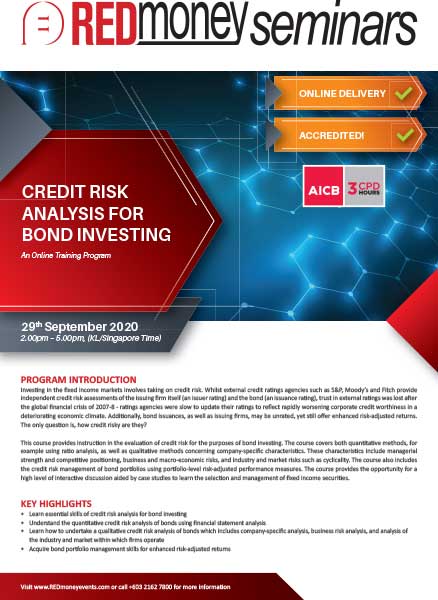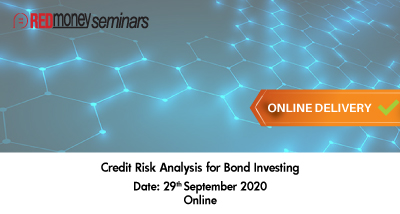
PROGRAM INTRODUCTION
Investing in the fixed income markets involves taking on credit risk. Whilst external credit ratings agencies such as S&P, Moody’s and Fitch provide independent credit risk assessments of the issuing firm itself (an issuer rating) and the bond (an issuance rating), trust in external ratings was lost after the global financial crisis of 2007-8 - ratings agencies were slow to update their ratings to reflect rapidly worsening corporate credit worthiness in a deteriorating economic climate. Additionally, bond issuances, as well as issuing firms, may be unrated, yet still offer enhanced risk-adjusted returns. The only question is, how credit risky are they?
This course provides instruction in the evaluation of credit risk for the purposes of bond investing. The course covers both quantitative methods, for example using ratio analysis, as well as qualitative methods concerning company-specific characteristics. These characteristics include managerial strength and competitive positioning, business and macro-economic risks, and industry and market risks such as cyclicality. The course also includes the credit risk management of bond portfolios using portfolio-level risk-adjusted performance measures. The course provides the opportunity for a high level of interactive discussion aided by case studies to learn the selection and management of fixed income securities.
KEY LEARNING OUTCOMES
- Learn essential skills of credit risk analysis for bond investing
- Understand the quantitative credit risk analysis of bonds using financial statement analysis
- Learn how to undertake a qualitative credit risk analysis of bonds which includes company-specific analysis, business risk analysis, and analysis of the industry and market within which firms operate
- Acquire bond portfolio management skills for enhanced risk-adjusted returns
1 participant: RM650
2 participants: RM1,170
3 participants: RM1,658
4 participants: RM2,080
5 participants: RM2,438
Early Payment Discount: Payments made on or before 22nd September will receive a 5% discount
* Further attractive packages are available for groups of more than five. Please contact us directly
If you are looking for an in-house training program or wish to send a group to an existing public program, kindly please contact Andrew Tebbutt at [email protected] or +603 2162 7802.
Learn More
Kindly complete the registration form and email to [email protected] or fax +603 2162 7810
Online Delivery
For enquiries please contact:
Normariya Sariman
Account Manager, REDmoney Seminars
[email protected]
Direct Line: +603 2162 7800 ext 44
Ramesh Kalimuthu
Events Sales Director
[email protected]
Direct Line: +603 2162 7800 ext 65
Fax: +603 2162 7810
For sponsorship & speaking opportunities:
Andrew Tebbutt
Managing Director
[email protected]
Direct Line: +603 2162 7802
For marketing and media enquiries
Govina Selvanthran
Marketing Manager
[email protected]
Direct Line: +603 2162 7800 ext 22

PROGRAM INTRODUCTION
Investing in the fixed income markets involves taking on credit risk. Whilst external credit ratings agencies such as S&P, Moody’s and Fitch provide independent credit risk assessments of the issuing firm itself (an issuer rating) and the bond (an issuance rating), trust in external ratings was lost after the global financial crisis of 2007-8 - ratings agencies were slow to update their ratings to reflect rapidly worsening corporate credit worthiness in a deteriorating economic climate. Additionally, bond issuances, as well as issuing firms, may be unrated, yet still offer enhanced risk-adjusted returns. The only question is, how credit risky are they?
This course provides instruction in the evaluation of credit risk for the purposes of bond investing. The course covers both quantitative methods, for example using ratio analysis, as well as qualitative methods concerning company-specific characteristics. These characteristics include managerial strength and competitive positioning, business and macro-economic risks, and industry and market risks such as cyclicality. The course also includes the credit risk management of bond portfolios using portfolio-level risk-adjusted performance measures. The course provides the opportunity for a high level of interactive discussion aided by case studies to learn the selection and management of fixed income securities.
KEY LEARNING OUTCOMES
- Learn essential skills of credit risk analysis for bond investing
- Understand the quantitative credit risk analysis of bonds using financial statement analysis
- Learn how to undertake a qualitative credit risk analysis of bonds which includes company-specific analysis, business risk analysis, and analysis of the industry and market within which firms operate
- Acquire bond portfolio management skills for enhanced risk-adjusted returns
This course has been specifically designed for the benefit of bank employees from across the institution. Those with roles which may be specifically enhanced/informed by the course include:
- Chief Executive Officers
- Chief Risk Officers
- Chief Financial Officers
- Financial Risk Managers
- Treasury managers
- Risk Analysts
- Financial Analysts
- Middle-office treasury risk
- Relationship managers
- Credit risk officers
- Credit origination teams
- Credit Managers
- Credit Portfolio Managers
- Corporate bankers
- Retail bankers
- Operations managers and operations teams
This training program will be delivered online through a stable, secure and free-to-access platform. The program itself will be delivered through lectures, worked examples and case studies in order to ensure a detailed and practical understanding of the program content. Participants will have plenty of opportunity to ask questions and interact with the program director. Login details and program materials will be sent to participants upon receipt of payment
1 participant: RM650
2 participants: RM1,170
3 participants: RM1,658
4 participants: RM2,080
5 participants: RM2,438
Early Payment Discount: Payments made on or before 22nd September will receive a 5% discount
* Further attractive packages are available for groups of more than five. Please contact us directly
If you are looking for an in-house training program or wish to send a group to an existing public program, kindly please contact Andrew Tebbutt at [email protected] or +603 2162 7802.
Learn More
Kindly complete the registration form and email to [email protected] or fax +603 2162 7810
Online Delivery
AGENDA
- Background to ratio analysis
- Income statement analysis
- Analysing the income statement as the earnings source for interest payments
- Revenues and earnings - sources, sustainability, and growth outlook
- Adjusting for exceptional and non-core items
- Use of EBITDA versus EBIT
- Ratio analysis: margins, interest cover, and dividend cover
- Cash flow statement analysis
- Analysing the cash profile of the firm - can cashflow service debt obligations?
- Differences between operating earnings and operating cashflow
- Primary and secondary sources of debt repayment
- Ratio analysis: Interest and investment coverage, debt service and debt repayment coverage, cash conversion ratios, dependence on external financing, and dividend coverage
- Balance sheet statement analysis
- Analysing the balance sheet as the asset source for principal repayments
- Off balance sheet liabilities
- Analysing net working capital
- Liquidity analysis
- Ratio analysis: leverage ratios, liquidity ratios, current ratio, quick ratio, cash ratio, asset coverage ratio, working capital ratios, and asset turnover
- Competitor and industry benchmarking for effective ratio analysis
- Business risk
- What are the key business risks faced by the firm and are there any mitigating factors?
- Analysis of the sovereign and macro-economic conditions
- What are the levels and trends in sovereign credit ratings where the firm has its main areas of activity?
- What are the macro-economic conditions, including currency, inflation, interest rates, growth rates, and political risks?
- Industry and market
- What is the competitive landscape - Porter's five forces
- What is the growth outlook? - industry life cycle and cyclicality
- What is the earnings quality?
- Is the business or regulatory environment changing?
- Capital intensity and the cost base
- Company-specific characteristics
- Management, the Board and corporate governance
- Operating, capital and corporate finance strategies
- Competitive advantages and cost position - does the firm create value?
- Product/service offerings, product/service differentiation, and pricing power
- Diversification versus focus
- Vertical integration versus sub-contracting
- Credit portfolio risk management
- Analysis of the loss distribution
- Risk-adjusted performance
- Expected loss versus Unexpected loss
- Managing the market risk of a bond portfolio
- Identifying the signs of distressed debt
- Strategic decisions gone wrong
- Management’s failure to respond effectively to changes in the competitive environment
- Problems with the cost structure
- Problems with the capital structure
- Capital adequacy requirements and provisioning
EXPERT COURSE DIRECTOR

Dr Ken Baldwin
Former Director, Financial Policies & Planning, Islamic Development Bank
Dr. Ken Baldwin has worked as a practitioner in banking and finance for over 25 years in senior positions spanning the front and middle offices. Having graduated from Oxford University with a first-class honors degree in Physics in 1989, he qualified as a Chartered Accountant with PWC, before joining UBS, and then later Credit Suisse, in derivatives risk and control functions based in London.
He gained a PhD in the microeconomic theory of risk sharing in Islamic contracts, and worked in the GCC for 15 years in Islamic retail and Islamic investment banks. Whilst at Abu Dhabi Islamic Bank, Dr. Ken built an ALM analytic technology platform capable of capturing liquidity and interest rate risks inherent in the many varied Islamic financing products used at retail and corporate levels. He then moved to take up the position of MENA Regional Head of Quantitative Analysis for Citigroup. At Citicorp, Dr. Ken worked on structuring complex products used by Gulf-regional corporations to hedge FX and interest risks. Still residing in Bahrain, Dr. Ken then joined Investcorp, where he worked on the risk due diligence of corporate private equity and real estate private equity transactions and portfolio management. After leaving Investcorp, he set up the risk management department for venture capital bank, providing Basel III compliance and deal analysis for the bank. He then operationalized a new Islamic investment bank as its Chief Operating Officer for 3 years, before his most recent industry role at the Islamic Development Bank, where he set up and ran a new department tasked with developing Financial Policies and Planning underpinned by robust financial analytic tools and methodologies designed specifically for the IDB. Dr. Ken is currently a senior university lecturer in finance in the UK. He has published quantitative finance articles in peer-reviewed academic journals including the Journal of Risk, and during his earlier career, taught CFA and FRM professional certifications as a pastime for the Bahrain Institute of Banking and Finance.
Ken is a British Muslim.
WHO WILL BENEFIT
- Chief Executive Officers
- Chief Risk Officers
- Chief Financial Officers
- Financial Risk Managers
- Treasury managers
- Risk Analysts
- Financial Analysts
- Middle-office treasury risk
- Relationship managers
- Credit risk officers
- Credit origination teams
- Credit Managers
- Credit Portfolio Managers
- Corporate bankers
- Retail bankers
- Operations managers and operations teams
PROGRAM FORMAT
This training program will be delivered online through a stable, secure and free-to-access platform. The program itself will be delivered through lectures, worked examples and case studies in order to ensure a detailed and practical understanding of the program content. Participants will have plenty of opportunity to ask questions and interact with the program director. Login details and program materials will be sent to participants upon receipt of payment
For enquiries please contact:
Normariya Sariman
Account Manager, REDmoney Seminars
[email protected]
Direct Line: +603 2162 7800 ext 44
Ramesh Kalimuthu
Events Sales Director
[email protected]
Direct Line: +603 2162 7800 ext 65
Fax: +603 2162 7810
For sponsorship & speaking opportunities:
Andrew Tebbutt
Managing Director
[email protected]
Direct Line: +603 2162 7802
For marketing and media enquiries
Govina Selvanthran
Marketing Manager
[email protected]
Direct Line: +603 2162 7800 ext 22



